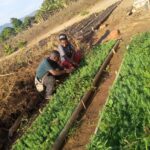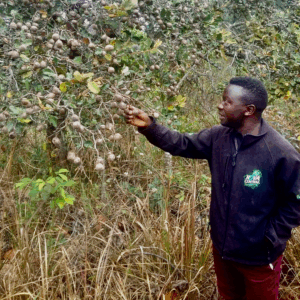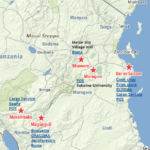 farip supports innovation in rural areas in Africa and targeted attempts to improve the income of farming families with new business ideas. Small farmers are increasingly focusing their business ideas on fair trade and their own transport chain – without intermediaries – from the collection points in the highlands to the points of sale, and on direct marketing in the city. farip plays the role of both a microcredit bank and a coach and advisor to help these proactive people move forward. This gives them the chance to show in an experimental phase that their ideas can work.
farip supports innovation in rural areas in Africa and targeted attempts to improve the income of farming families with new business ideas. Small farmers are increasingly focusing their business ideas on fair trade and their own transport chain – without intermediaries – from the collection points in the highlands to the points of sale, and on direct marketing in the city. farip plays the role of both a microcredit bank and a coach and advisor to help these proactive people move forward. This gives them the chance to show in an experimental phase that their ideas can work.
DONATE NOW
 Ragpa and Christina Tweve in Magunguli have been raising local wild trees in a small tree nursery for many years. To expand their work, they need more equipment, materials, and a risk guarantee. farip plans to support the nursery with a loan and wants to ensure that the state forestry offices can learn from this village-based approach to biodiversity. farip is funded by donations and contributions.Thank you for standing with smallholder farmers!
Ragpa and Christina Tweve in Magunguli have been raising local wild trees in a small tree nursery for many years. To expand their work, they need more equipment, materials, and a risk guarantee. farip plans to support the nursery with a loan and wants to ensure that the state forestry offices can learn from this village-based approach to biodiversity. farip is funded by donations and contributions.Thank you for standing with smallholder farmers!
A shift is taking place in Tanzania’s forest economy
 Farming families have always sensed that their natural forests hold value. But they could not turn this value into anything useful. With Rahel from reilo., they found someone who speaks with them about biodiversity. This opened new paths. In February, seven families began a pilot with reilo. They received loans for crop production, backed by their biodiverse forests.
Farming families have always sensed that their natural forests hold value. But they could not turn this value into anything useful. With Rahel from reilo., they found someone who speaks with them about biodiversity. This opened new paths. In February, seven families began a pilot with reilo. They received loans for crop production, backed by their biodiverse forests.
Biodiversity is in demand! Many farming families are expanding their natural forests with native tree species. They are highly motivated to protect, care for, and further develop their forests. With biodiversity, they could secure small loans for beans and potatoes.
Demand for seedlings is now rising quickly at the nursery of Ragpa and Christina Tweve in Magunguli, who have been raising local wild trees for many years. To expand their work, they need more equipment, materials, and a risk guarantee.
Read more about biodiversity..
The First Training Courses for Forest Wardens “Watunza Misitu”
 The tree-secured credit system TCRD can soon be used in the whole region around Magunguli. “We urgently need to train more Watunza, so that families in nearby villages can also join,” says Ragpa Tweve, the first forest warden “Mtunza Misitu” in Magunguli. Forest wardens take care of registering and checking the farmers’ tree plots. farip is now supporting the first forest warden training with start-up funding of CHF 12,000. With your donation, you help fund the first training courses. These include growing native plants, registering tree plots for credit security, bookkeeping, and more. We thank you very much on behalf of Ragpa and his team for your financial support!
The tree-secured credit system TCRD can soon be used in the whole region around Magunguli. “We urgently need to train more Watunza, so that families in nearby villages can also join,” says Ragpa Tweve, the first forest warden “Mtunza Misitu” in Magunguli. Forest wardens take care of registering and checking the farmers’ tree plots. farip is now supporting the first forest warden training with start-up funding of CHF 12,000. With your donation, you help fund the first training courses. These include growing native plants, registering tree plots for credit security, bookkeeping, and more. We thank you very much on behalf of Ragpa and his team for your financial support!
Read more about “Watunza Misitu”..
RISK-REDUCED CREDITS FOR RURAL DEVELOPMENT
 “We could double our production, if we could get loans. When we need cash we cut some trees we had planted and sell the timber. But instead of cutting the trees, can we give our trees as security to get a bank loan to grow more beans? If we can pay back, the trees are still there and growing, and we can take out a next loan for again growing more beans”. Suzanna Mfikwa is a farmer in Magunguli village. She and her colleagues in the Magunguli Tree Grower Association came up with an idea, a group of smallholder farmers in Magunguli refined this great idea: Offer growing trees as collateral for loans? This idea started the TCRD mechanism a couple of years ago – Tree-secured Credits for Rural Development, using the still growing trees as security for loans to increase agricultural production.
“We could double our production, if we could get loans. When we need cash we cut some trees we had planted and sell the timber. But instead of cutting the trees, can we give our trees as security to get a bank loan to grow more beans? If we can pay back, the trees are still there and growing, and we can take out a next loan for again growing more beans”. Suzanna Mfikwa is a farmer in Magunguli village. She and her colleagues in the Magunguli Tree Grower Association came up with an idea, a group of smallholder farmers in Magunguli refined this great idea: Offer growing trees as collateral for loans? This idea started the TCRD mechanism a couple of years ago – Tree-secured Credits for Rural Development, using the still growing trees as security for loans to increase agricultural production.
farip presented the TCRD venture to the Swiss Agency for Development and Cooperation (SDC) and made it to the finals of the International Cooperation Forum 2025, among the top 10 projects.
Read here all about tree-secured credits for rural development TCRD..
HOW DOES SCOUTING WORK
 How does scouting work? What is the pathway from idea to experimentation? How can an interesting idea from rural Africa be transformed into a successful small business? It takes scouting! This is what farip specialises in: “scouting”. We pick up ideas brought to us by proactive people in rural Africa. farip then digs deeper and challenges these ideas, asking questions like: Who are the innovative potential entrepreneurs and their team members who want to bring this innovation to life? How do they organise themselves? Which technical tests can show whether the business idea is feasible? And where is the market for the products?
How does scouting work? What is the pathway from idea to experimentation? How can an interesting idea from rural Africa be transformed into a successful small business? It takes scouting! This is what farip specialises in: “scouting”. We pick up ideas brought to us by proactive people in rural Africa. farip then digs deeper and challenges these ideas, asking questions like: Who are the innovative potential entrepreneurs and their team members who want to bring this innovation to life? How do they organise themselves? Which technical tests can show whether the business idea is feasible? And where is the market for the products?
MAP OF FARIP’S ACTIVITIES
 farip’s ventures are concentrated actually in Tanzanias southern highlands around Makambako and Magunguli, as well as along the cargo service’s route to Dar es-Salaam, in Msowero and Morogoro. farip also supports ventures in Dar es-Salaam.
farip’s ventures are concentrated actually in Tanzanias southern highlands around Makambako and Magunguli, as well as along the cargo service’s route to Dar es-Salaam, in Msowero and Morogoro. farip also supports ventures in Dar es-Salaam.
Updated: 2025-12-04
